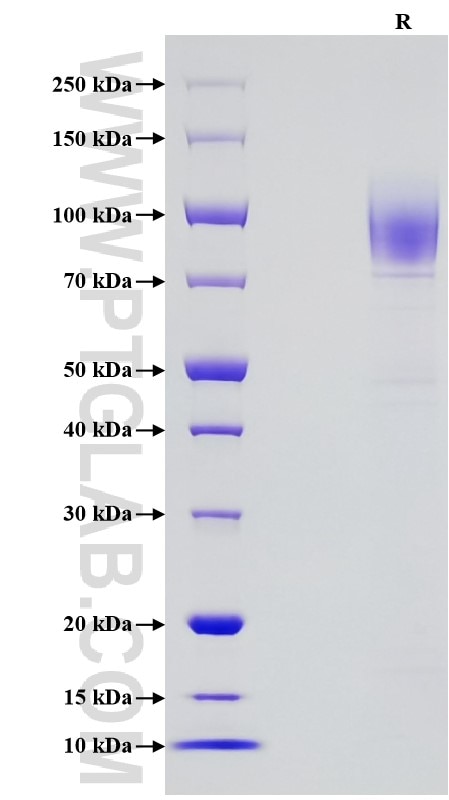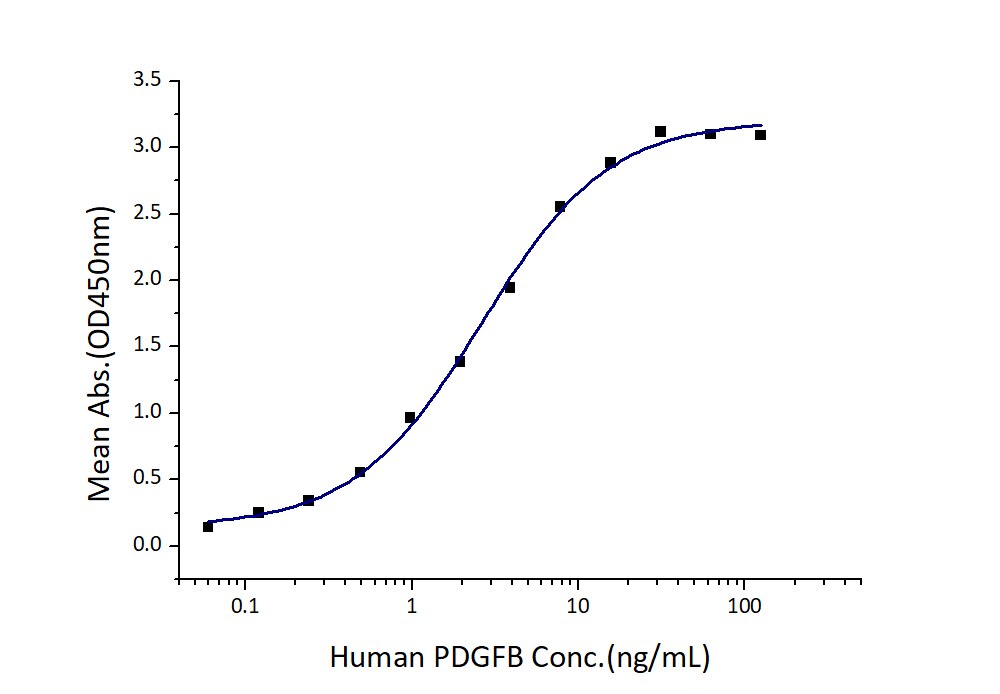Recombinant Human PDGFR beta/CD140b protein (Myc Tag, His Tag)
Species
Human
Purity
>90 %, SDS-PAGE
Tag
Myc Tag, His Tag
Activity
EC50: 1-5 ng/mL
Cat no : Eg0147
Validation Data Gallery
Product Information
| Purity | >90 %, SDS-PAGE |
| Endotoxin | <0.1 EU/μg protein, LAL method |
| Activity |
Immobilized Human PDGFR beta (Myc tag, His tag) at 0.5 μg/mL (100 μL/well) can bind Human PDGFB (hFc tag) with a linear range of 1-5 ng/mL. |
| Expression | HEK293-derived Human PDGFR beta protein Leu33-Lys531 (Accession# P09619-1(S180F)) with a Myc tag and a His tag at the C-terminus. |
| GeneID | 5159 |
| Accession | P09619-1 |
| PredictedSize | 61.6 kDa |
| SDS-PAGE | 75-110 kDa, reducing (R) conditions |
| Formulation | Lyophilized from 0.22 μm filtered solution in PBS, pH 7.4. Normally 5% trehalose and 5% mannitol are added as protectants before lyophilization. |
| Reconstitution | Briefly centrifuge the tube before opening. Reconstitute at 0.1-0.5 mg/mL in sterile water. |
| Storage Conditions |
It is recommended that the protein be aliquoted for optimal storage. Avoid repeated freeze-thaw cycles.
|
| Shipping | The product is shipped at ambient temperature. Upon receipt, store it immediately at the recommended temperature. |
Background
Multiple receptor tyrosine kinases and their growth factor ligands have been implicated in cancer progression and metastasis. Among these are the platelet-derived growth factor receptors (PDGFRs). Expression of PDGFRs is mainly restricted to mesenchymal cell types. PDGF is composed of homo-dimers or hetero-dimers of two polypeptide chains, denoted A and B. The two receptor subtypes show different affinities for the dimeric PDGF isoforms. In epithelial tumors, the platelet-derived growth factor receptor B (PDGFRB, also known as PDGFR beta) is mainly expressed by stromal cells of mesenchymal origin. it has also been shown that PDGFRB is also associated with the aggressive behavior of several types of tumors. The 60% of colon cancer patients express high levels of this gene and the PDGFRB expression correlates with lymphatic dissemination of this cancer. Furthermore, PDGFRB signaling in mesenchymal-like tumor cells (as colorectal cancer cells) contributes to invasion and liver metastasis formation.
References:
1.Ernst J A Steller. et al. (2013). Neoplasia. 15(2):204-217. 2.Arne Ostman. et al. (2007). Adv Cancer Res. 97:247-274. 3.Ombretta Melaiu. et al. (2017). Genes Cancer. 8(1-2):438-452. 4.C E Hart. et al. (1988). Science. 240(4858):1529-1531. 5.Thomas C Wehler. et al. (2008). Oncol Rep. 19(3):697-704.


